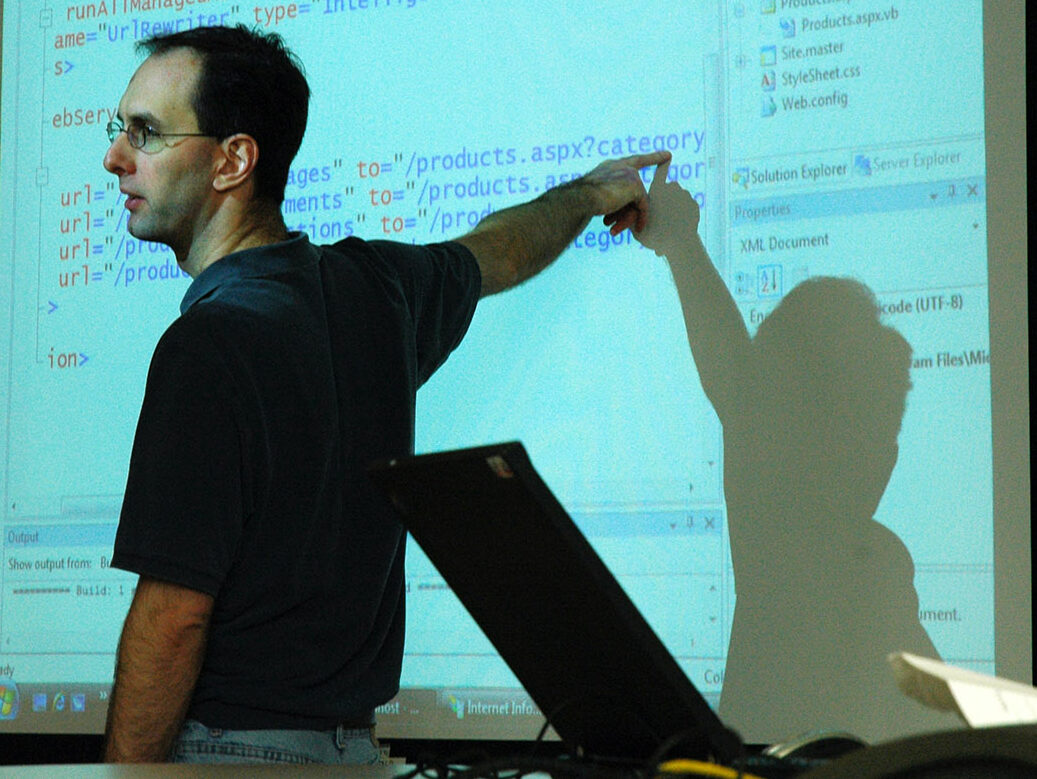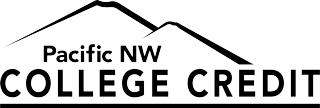
CTE Dual Credit Teachers! 🎓🌟
If you teach a class that is part of the CTE Dual Credit program, we kindly ask for your dedication to the following three expectations, as outlined in the Teacher Verification form signed each fall:
- Cover All Competencies: Ensure you teach 100% of the articulated college course competencies
- Inform Students: Let all your students know about the opportunity to earn dual credit & include program information on your syllabus
- Grade in SERS: Grade 100% of the students on your SERS class roster(s) before the June 25th deadline
Stay Informed
We highly encourage all teachers and district staff involved with the CTE Dual Credit program to participate in a yearly check-in session. The annual check-in sessions serve as an opportunity for teachers and district staff involved in the CTE Dual Credit program to connect with PNWCC staff, review program updates, and address any questions or concerns.
Types of Sessions
- 15-minute Check-In: A brief session to touch base, discuss any administrative matters, and share updates.
- 30-minute Refresher: A program overview covering any recent changes, and best practices, with time for Q & A
- 60-minute Program Overview: A comprehensive session providing an in-depth understanding of the program, including policies and procedures, annual timeline, articulation of courses, training in SERS, and registration steps for students
Scheduling Options
- Use the Booking Site: Visit my booking site to select your preferred session length and time
- Attend a Scheduled Session: Pre-scheduled session dates are below
- Email CTE@PNWcollegecredit.org
Drop-In Sessions
-
Tuesdays & Thursdays, 2:30 - 3:30pm
Drop-in sessions are held in Amy's Zoom room: Join Now!
Meeting ID: 602 106 0210 Passcode: PNWCC
Student Registration Assistance
We are happy to assist with student registration either by visiting your school in person or presenting virtually via Teams, Zoom, or Google Meet — whatever works best for you and your students. Our typical presentation includes a variety of slides explaining PNWCC and the CTE Dual Credit program, a demonstration of how to use SERS - Student Enrollment & Report System (the CTE Dual Credit registration website), walking students through how to create an account and register their class, plus fun SWAG.
To schedule presentations, email: CTE@PNWcollegecredit.org
Materials
We have a variety of marketing materials available both online or we can print for you:
PNWCC-Articulation-Request-Checklist
PNWCC – TIPS 4 Teachers & Staff
PNWCC Registration Instructions A
PNWCC Registration Instructions B
CTE Dual Credit Kickoff Event
For College & Career Specialists & CTE Staff
This event is ideal for College & Career Specialists, CTE Staff, and others who support students earning CTE Dual Credit from PNW College Credit Consortium Partner School Districts. Join us for a motivating and informative kickoff to support your work with students in the CTE Dual Credit program.
More details & registration form can be found here
📅 Date: Thursday, December 18
🕒 Time: 11:00 am – 2:30 pm
📍 Location: WANIC Skill Center – Allied Health Building, Lecture Hall A102
Lake Washington Institute of Technology
11605 132nd Ave NE, Kirkland, WA
Directions: https://www.lwtech.edu/about/directions/,
Statewide Enrollment & Reporting System (SERS)
SERS, the Statewide Enrollment & Reporting System, is the registration system for all CTE Dual Credit students in Washington State. Students, Teachers, College Registrars, District Staff, and consortium staff are each granted access to their necessary parts of this site.
Your SERS Account
- Teachers are assigned a SERS account when a class they teach becomes eligible for CTE Dual Credit
- SERS system automatically sends new users an email notice requesting that users choose a password (be sure to check your junk mail!)
- If you missed this email, let us know and we will reset for you
Your commitment plays a vital role in shaping students’ educational journeys and preparing them for success in both high school and college. Thank you for your dedication! 🌟📚

Articulation
What is Articulation?
Articulation agreements grant college credit to high school students who have achieved the level of knowledge and skill required for the specified course.
What is the process of articulation?
A request for articulation typically begins with the high school instructor or CTE Director.
- High school instructor completes High School Request for Articulation form.
- High school instructor submits a copy of the completed High School Request for Articulation form to their CTE director/principal.
- The high school instructor or CTE Director sends the completed form and supporting documents to the CTE Dual Credit Consortium – Pacific NW College Credit (PNWCC).
- If the course/program is currently available at one or more consortium college/s, PNWCC staff will work with the high school instructor and CTE Director to complete the articulation process.
- If the course/program is not available within the consortium’s college/s, PNWCC will query other consortia for possible matches, in the same region when possible.
- PNWCC staff forward a copy of the articulation request to the college faculty for review.
- PNWCC staff arranges an in-person or virtual meeting to include PNWCC staff, college and high school instructors, college program chair/dean, and CTE Director.
What is reviewed in the articulation meeting?
Description and discussion of college course competencies
- Place within the larger program
- Certificates and degrees
- Specialized items to include:
- prerequisites
- textbooks
- software applications
- special projects
- industry connections and certifications if available
- Articulation with 4-year programs
- Career pathways for program grads
- Future direction of program
Description of current high school class
- Syllabus
- Class framework
- Class competencies
- Total class hours
- Assessment measures
- Specialized equipment to include:
- textbooks
- software applications
- Industry connections
- Certifications available
- Internship options
- Future direction of high school program
What are the possible outcomes of the articulation review?
- If approved, PNWCC staff draft and route the Articulation Agreement document to college and high school partners to obtain signatures. When the signature process is complete, copies are redistributed, then articulation is added to the CTE Dual Credit online registration system (CTE SERS - Statewide Enrollment & Reporting System).
- If the high school class does not contain all of the college course competencies, PNWCC staff will work with instructors to determine the feasibility of – and timeframe for – revising the high school class, gathering additional curriculum/class information, and making revisions to the high school curriculum. The college will review again, once the class has been revised.
- If no matching college programs exist within the consortium, PNWCC staff will notify high school partners. PNWCC staff will then look for matches outside the local consortium. See step 3.2. above.
- If a course is no longer taught at high school or college, the consortium is notified in a timely manner. PNWCC staff will turn articulation inactive in SERS (online registration system) during the summer following the school year that the course is deactivated. All course changes must take place during summer and prior to registration opening for that school year.
What is the background of articulation?
The articulation process is framed, defined, and validated by the following:
- RCW 28B.50.530 – Agreements between district boards of trustees and school boards
- WAC 131-15-095 (2) – Teacher credentials
- State Board for Community and Technical Colleges Policy Manual
- WA ST Tech Prep Association Articulation Guidelines Handbook
- PNWCC Memorandum of Agreement
- Carl D. Perkins Career and Technical Education Improvement Act of 2006
- SSB 6377 – Legislative support for articulation between high schools and community and technical colleges
What are the standardized documents for articulation?
The following are standardized documents used statewide:
- Consortium Memorandum of Agreement (Master articulation agreement) is reviewed and re-signed every three years by lead administrators of the Consortium’s secondary and postsecondary education partners (college presidents and school district superintendents).
- Program Articulation Agreements are reviewed/updated regularly, on a three-year rotation, or as deemed necessary, due to changes in class/course content, structure, etc.
- Teacher Verification Forms, certifying high school teachers responsible for teaching 100% of college course competencies, are signed annually.
- High School Request for Articulation Form
- College Competency Checklist
Grading
Questions on how to navigate SERS and grade your students? Check out our video below!
Types of Currently Articulated Class Types
Arts & Communications
Graphic Arts
- Graphic Arts
- 2-D Design
- Graphic Design/Digital Design
- Digital Photo & Design/Photoshop
- Digital Imaging
- Graphic Production
- Computer Graphics
- Visual Communications
- Photography/Photo Portfolio
- Yearbook/Publishing
- Business Art Design
Web-Based
- Web Design
- Web Publishing
Animation & Game Design
- Animation
- 3D Animation & Game Design
- Simulation Design
- Advanced Multimedia Design
TV, Video, Film
- Media/TV/Video Production
- Video Documentary
- TV Broadcasting
- Digital Media Production
- Film Analysis
Other Arts & Communications Classes
- Technical Theater
- Interior Design
Business & Marketing
General Business
- Business, Intro to
- Business Career Choices
- Business Communications
- Business Math
- Entrepreneurship
- Business/ Personal Law
- Marketing, Sales & Advertising
Marketing
- Business, Intro to
- Business Career Choices
- Business Communications
- Business Math
- Entrepreneurship
- Business/ Personal Law
- Marketing, Sales & Advertising
Microsoft
- MS IT Academy: PowerPoint, SharePoint
- MS Office/Business Technology
- MS Imagine Academy
- Microsoft Applications/Office Certifications
- MS Office Specialist/Expert – Excel, Outlook, Access, PowerPoint, Word
Retail
- Retail Management
- Student Store
- Retail Store Operations
Accounting/Finance
- Accounting 1 - 4
- Financial Algebra
- Personal Finance
- Financial Fitness
- Financial Planning
Other Business Classes
- Fashion Merchandising
Engineering and Technology
Engineering
- Engineering, Intro to
- Principles of Engineering
- Engineering Technology
- Sustainable Design & Environmental Engineering
- Applied Technical Math
- Engineering Design
- CAD
- Applied Engineering & Manufacturing
- Architecture & Engineering Tools & Techniques
Manufacturing
- Manufacturing Technology
- Material Science
- Aerospace Manufacturing
Automotive Technology
- Auto Tech - Brake Systems
- Auto Basics: Maintenance Procedures
- Auto Tech: Suspension, Steering & Alignment
- Auto Tech: Engines, Cylinder Blocks & Cooling Systems
Health & Human Services
Culinary Arts Classes
- Cooking for Wellness
- Culinary Arts
- Food Science
- Chef
- Baking & Pastry Arts
- Quantity Cooking Lab
- Pantry Preparation
- Food Server
- Hot & Cold Sandwich Preparation
- Food Service Sanitation
Health/Healthcare Classes
- Healthcare, Intro to
- Health or Health Online
- Safety for Healthcare
- Wellness for Healthcare
- Biotechnology
- Health Science Careers
- Healthcare Professions
- Anatomy & Physiology
- Medical Terminology
- Exam Room & Patient Prep
- Medical Law & Ethics
- Nursing Assistant Foundations
- Basic Patient Care
- Dental Careers
- Sports Medicine
Human Development Classes
- Human Systems
- Human Body Systems
- Child Development
- Parenting
- Family Health
- Family Systems
- Careers in Education
- Teaching Academy/Teacher Education Academy
Legal System Classes
- Criminal Justice
- Police Forensics
- Forensic Science
- Law & Ethics
Interpreting Classes
- Fundamentals of Interpreting
- American Sign Language 1, 2
Information Technology
General IT Classes
- Computer Science: Introduction to, Principles, Advanced
- Computer Technology
- IT Academy
- PC Analysis & Configuration
Programming/Coding Classes
- Programming, Intro to
- Coding in Python
- Computer Science: Java
- Computer Applications
- Programming Topics
Networking & Cybersecurity Classes
- Cisco Networking
- Server Support
- Advanced Cisco – Cybersecurity
- CyberSecurity
Computer Repair Classes
- Computer Installation & Repair
- Computer Repair Lab
- Hardware Support
- Software Support
Science & Natural Resources
Agriculture & Horticulture Classes
- Horticulture - Intro
- Horticulture - Nursery & Greenhouse Operations
- Ag Design & Engineering
- Agriculture, Food & Natural Resources
- Plant Biology
- Urban Agriculture
- Food Science
- AgriScience
Environmental Science Classes
- Environmental Science
- Fire & EMS
Welding & Metal Fabrication Classes
- Welding/ Metal Fabrication
- Shielded Metal Arc Welding
- Flux Core Arc Welding
- Gas Tungsten Arc Welding
- Carbon Arc, Plasma, & Oxy-Acetylene Cutting
- Manufacturing & Fabrication
Other Science & Natural Resource Classes
- Introduction to Electronics
Sample Text for Syllabi
Here is some suggested language which you may want to include in your class syllabus.
Pacific Northwest College Credit
This is a CTE Dual Credit approved course that is articulated with (Name of college and program area). Students who demonstrate proficiency of the college course competencies with a ‘B’ (3.0) or better grade, may be eligible to earn college credit through the CTE Dual Credit program.
The college competencies are attached to this syllabus. During the (semester/year) all of the college competencies will be covered in class (some classes may require additional exams or certifications).
Students must register online using the statewide enrollment and reporting system https://www.ctesers.org and are required to pay a non-refundable $50 annual consortium fee to earn college credit through the Pacific Northwest College Credit program. Payments can be made through online payment site:
http://pnwcollegecredit.org/pay from December 1st through June 15th.
Students may earn credit for the following college courses:
(insert course number, course name and credit value)
Example: BTS 161 Business Software Essentials 5 college credits

